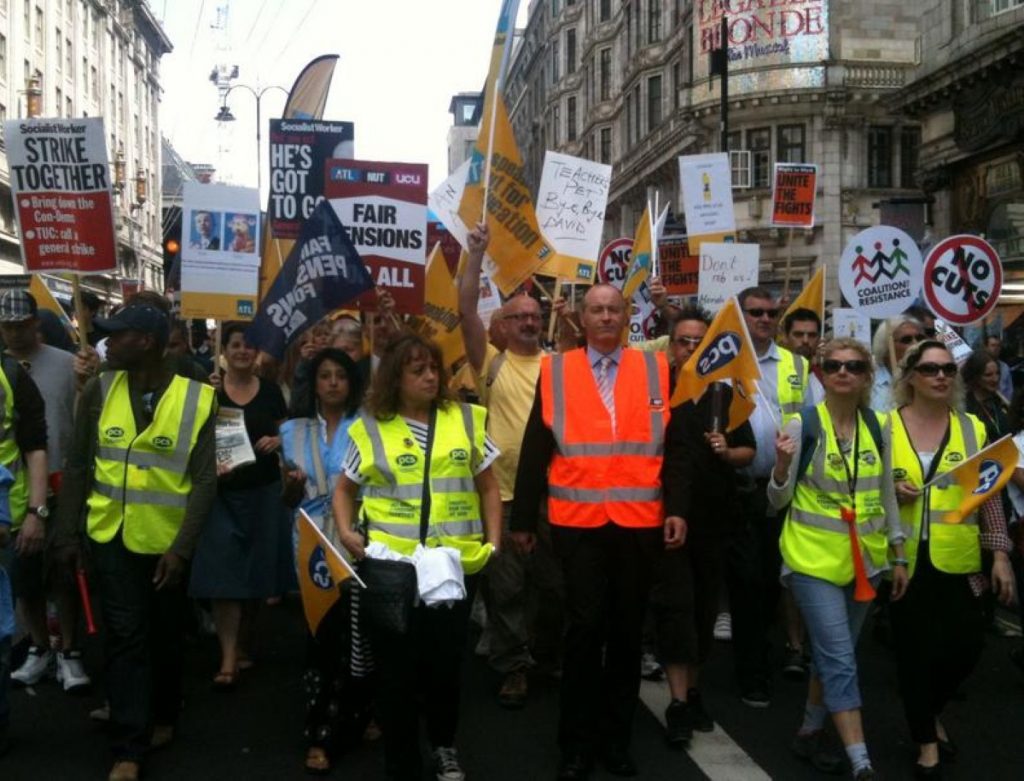Disruption disputed as strikers march on parliament
By Ian Dunt Follow @IanDunt
The first major industrial action against spending cuts took place today, amid frenzied attempts by both sides to dispute the extent of the disruption.
No10 insisted that "less than five" members of staff in Downing Street had gone on strike. It also said that the "vast majority" of job centres had remained open and that only a handful of courts had closed.
The Cabinet Office said just less than 100,000 civil servants were on strike – around a fifth of the workforce.
The UK Border Agency said only 18% of its staff didn't turn up to work. Contingency controls meant that there was less disruption than anticipated in Gatwick, Heathrow and Manchester.
It was more difficult for the government to argue that it had minimised disruption to schools, however, with thousands of parents having to make arrangements to deal with their children after 6,000 closed and another 6,000 were adversely affected.
Major cities were the worst affected, especially in Newcastle, Liverpool, and east London.
Private school teachers also took the rare step of walking out of work, with 20,000 – including teachers from Eton – estimated to have joined the effort to fight back against pension reform.
Two-thirds of universities cancelled lectures.
Four of the biggest unions in the UK – the Public and Commercial Services Union (PCS), the National Union of Teachers (NUT), the Association of Teachers and Lecturers (ATL) and the University and College Union (UCU) – agreed to industrial action.
The ATL tookg part in a strike for the first time in its 127-year history.
In London, tens of thousands of demonstrators wound their way through Whitehall to parliament, where there was a rally.
The largely good-natured and family-friendly protest was only slightly marred by some minor scuffles.
At one point police contained demonstrators in Whitehall. A total of 37 people were arrested in connection with the march.
The London protest was just one of many events taking place across the country, with demonstrations also taking place in Bath, Oxford, Birmingham, Nottingham, Liverpool, Manchester and Newcastle.
Early polls suggested that there was a surprising level of public support for the strike, with a Channel 4 poll showing 77% backed the action and 23% opposed it.
Cabinet Office minister Francis Maude struggled when under forensic examination on the Today programme this morning, when he was seemingly unable to answer why public sector pension reform was needed when its cost as a share of GDP was set to fall.
But union leaders were also roundly criticised for triggering industrial action while still taking part in negotiations with government.
"Everything we have ever worked for is under attack," Mark Serwotka, PCS head, said this morning.
While other major unions, such as Unite, declined to take part in today's action, the event is being treated as a litmus test of public tolerance by both sides of the dispute.
Almost every other relevant union will table a strike action later in the year unless there is movement in some direction on pension reform.
Downing Street has maintained a conciliatory tone in its communications to strikers but the party-political response has been ferocious.
The prime minister furiously attacked Mr Miliband for not speaking out more strongly against the action during PMQs yesterday, accusing him of being "in the pocket of the unions".





-01.png)